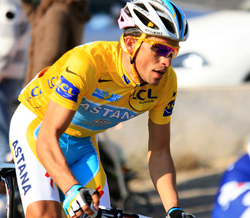Tour de France winner Contador faces long legal fight
 The World Anti-Doping Agency (WADA) is ready to appeal Alberto Contador’s doping case to the Court of Arbitration for Sport (CAS) in case of acquittal
The World Anti-Doping Agency (WADA) is ready to appeal Alberto Contador’s doping case to the Court of Arbitration for Sport (CAS) in case of acquittal
“I will not make any statements. The only thing I can say is that no matter what the Spanish Federation decides on Contador, WADA can always appeal to CAS, a resource that’s always been there,” a lawyer for WADA, Swiss Julien Sieveking told El País.
“It would not be the first time for us to do so. Just look on our website, the dozens of times we have acted against the national or international federations.”
The International Cycling Union (UCI) informed Contador on August 24 that he tested positive for Clenbuterol on July 21, the second rest day at the Tour de France. Contador announced the positive control on September 30, two months after he won the Tour de France by 39 seconds ahead of Luxembourg’s Andy Schleck. The UCI announced that same day that it provisionally suspended and earlier this month, asked the Spanish Cycling Federation (RFEC) to open a disciplinary hearing.
Clenbuterol helps breathing and weight loss. The World Anti-Doping Agency (WADA) lists it, at any level, as a banned substance. Contador’s urine sample revealed 50 picograms or 0.000 000 000 05 grams per millilitre.
Contador maintains his innocence and says that the drug came from eating a contaminated steak that his Astana team bought from the Spanish city of Irún. Clenbuterol produces lean beef, but European Union has banned its use since 1996. It controlled 83,203 animal samples in Europe between 2008 and 2009 and only sample was contaminated, and it was not from Spain.
RFEC prosecutors are reviewing documents from Contador, the UCI and the WADA, and will soon decide to issue a suspension or to shelf the case. However, recent history shows that Spain is not as strict as its European neighbours are.
Juan Carlos Castaño, president of the RFEC, spoke supportively of Contador earlier this month and said that he hopes he is cleared.
“Not only for the benefit of the cyclist, but it would be good for cycling,” Castaño said. “For a lot of reasons, because I have known him since he was a boy, because he was licensed in the Madrid federation for many year and he passed through all the categories, and I cannot have anything but empathy for him.”
The Spanish Federation’s disciplinary committee has three months to rule on the case according to the UCI’s guidelines. WADA’s director general, David Howman, supported Sieveking’s comments to El País that CAS would appeal an acquittal.
“There are perceived and potential conflicts, but I think the only thing we can say is that we have the right to appeal,” Howman told the New York Times.
The national federations “want to show us that they’re doing a good job, but they also really don’t want to have a controversy or embarrass their own sport, so there is a tension there all the time.”
WADA and UCI appealed the Spanish federation’s decision to acquit Alejandro Valverde of doping charges. CAS ruled on the case this May and issued Valverde a two-year suspension.
Howman explained that WADA appealed around 50 cases last year out of the nearly 2000 that were brought against athletes.